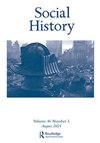State socialist women’s organizations within Yugoslav factories: a case study of local activism in the Duga Resa cotton mill
IF 1.1
1区 历史学
Q1 HISTORY
引用次数: 0
Abstract
ABSTRACT State socialist women’s organizations were particularly active in Yugoslav industrial towns with a significant female workforce, as in the case of the Croatian mill town of Duga Resa. By exploring the local activities of the Conference for the Social Activity of Women (KDAŽ), this article contributes to historiographical debates regarding state socialist women’s organizations and women’s agency as well as to the recent revival of interest in the social history of the post-Yugoslav region. An analysis of reflexive and representative archival sources, namely minutes of party and municipal meetings as well as official publications, shows that working women’s double burden was not silenced but was frequently discussed by socialist authorities, women’s organizations and female workers themselves. Through the Yugoslav politics of self-management, local KDAŽ activists often lobbied for better working and welfare rights, especially the provision of housing and childcare facilities for working mothers. While KDAŽ activists’ agency was shaped by dominant social norms, the possibilities for voicing open criticism in socialist Yugoslavia meant that a certain degree of bottom-up initiative was possible. The archives of municipal and socio-political organizations, therefore, are of fundamental importance in understanding working women’s position at the intersection of gender and labour history.南斯拉夫工厂内的国家社会主义妇女组织:杜加雷萨棉纺厂当地激进主义的个案研究
国家社会主义妇女组织在拥有大量女性劳动力的南斯拉夫工业城镇尤其活跃,例如克罗地亚的工业城镇杜加雷萨。通过探索妇女社会活动会议(KDAŽ)的当地活动,本文有助于关于国家社会主义妇女组织和妇女机构的史学辩论,以及最近对后南斯拉夫地区社会史的兴趣的复兴。对反映性和代表性的档案资料,即党和市政会议的记录以及官方出版物的分析表明,社会主义当局、妇女组织和女工本身并没有对劳动妇女的双重负担闭口不谈,而是经常加以讨论。通过南斯拉夫的自我管理政治,当地的KDAŽ积极分子经常游说争取更好的工作和福利权利,特别是为职业母亲提供住房和儿童保育设施。虽然KDAŽ活动人士的机构受到主流社会规范的影响,但在社会主义的南斯拉夫,公开表达批评的可能性意味着某种程度的自下而上的主动性是可能的。因此,市政和社会政治组织的档案对于了解职业妇女在性别和劳工历史交汇处的地位具有根本的重要性。
本文章由计算机程序翻译,如有差异,请以英文原文为准。
求助全文
约1分钟内获得全文
求助全文
来源期刊

Social History
HISTORY-
CiteScore
1.10
自引率
0.00%
发文量
37
期刊介绍:
For more than thirty years, Social History has published scholarly work of consistently high quality, without restrictions of period or geography. Social History is now minded to develop further the scope of the journal in content and to seek further experiment in terms of format. The editorial object remains unchanged - to enable discussion, to provoke argument, and to create space for criticism and scholarship. In recent years the content of Social History has expanded to include a good deal more European and American work as well as, increasingly, work from and about Africa, South Asia and Latin America.
 求助内容:
求助内容: 应助结果提醒方式:
应助结果提醒方式:


